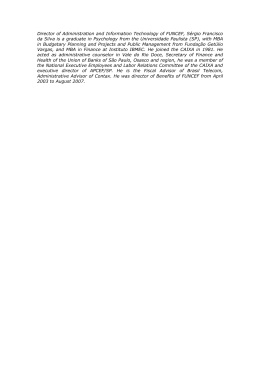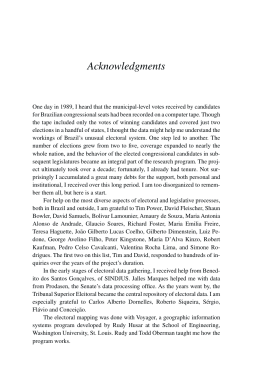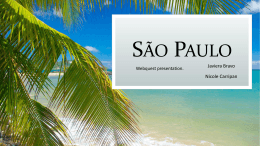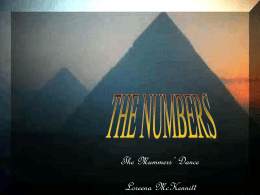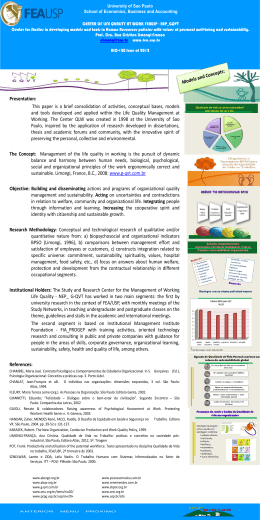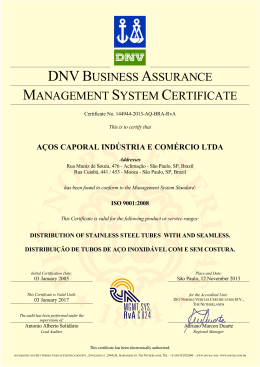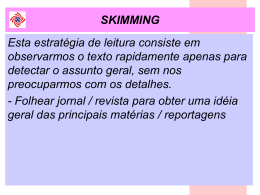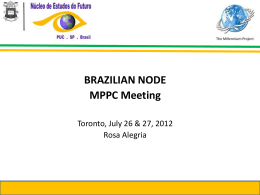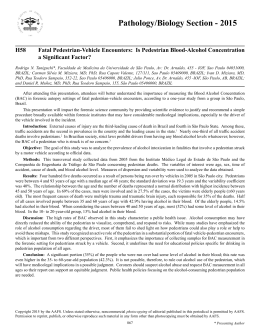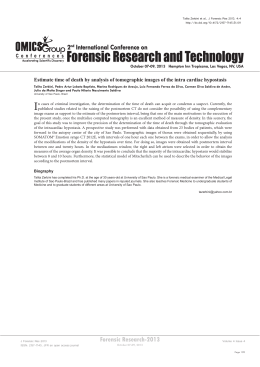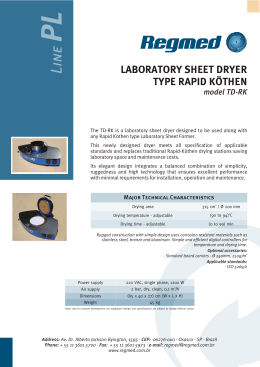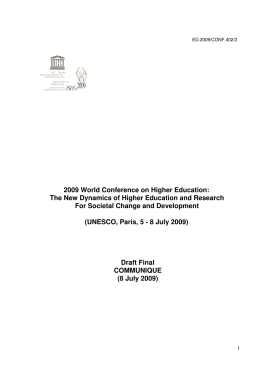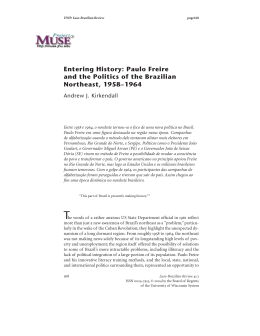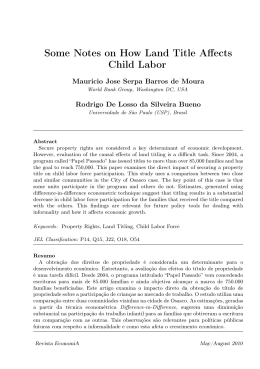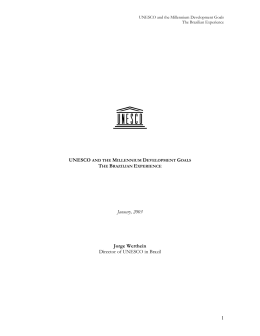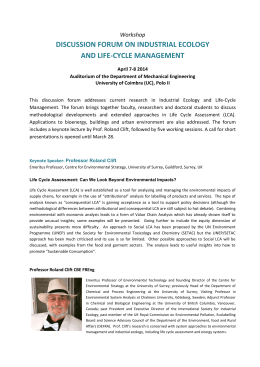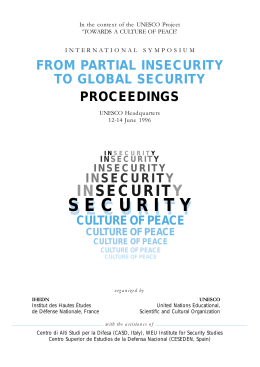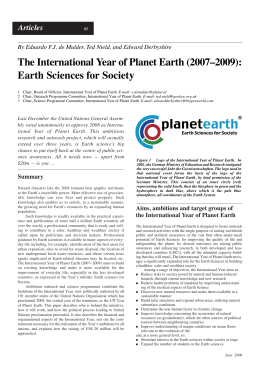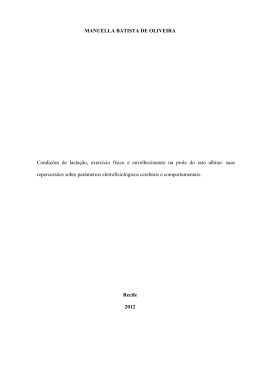Success Stories Brazil: When students awake, the whole world changes by Fernanda Favaro In the middle of the great hall, students whirl around at capoeira class, a Brazilian martial art form combining self‐defence, acrobatics, dance, music and song. Sparkling green eyes, focused on the journalist, leave no doubt: Sara, 10, wants to talk: "I knew children have rights, but now I know much more. I know how to use them." © UNESCO/Fernanda Favaro Sara, a fifth grader at the Marina Saddi Haidar municipal school, on the outskirts of Osasco, takes part in the “Seeds of Spring” project. Sara is a smart girl who loves to express herself but what makes her talk lately is the Seeds of Spring project. The initiative, developed in 134 public schools of Osasco, a city of 70,000 inhabitants in the southeast of Brazil, aims to make kids change agents in their lives, their schools and their communities. Students become systematically involved in democratic spaces, mediated by educators. They propose suggestions and turn their demands into concrete actions for local sustainable development. Up to 9,500 Osasco students from six to twelve years old have participated in the initiative, set up by a partnership between UNESCO, the Department of Education of Osasco and the Paulo Freire Institute (IPF) in 2008. In 2009 the project was presented as one of 25 selected good practices at the UNESCO World Conference on Education for Sustainable Development in Bonn, Germany. The project results spread to the whole school network: Seeds of Spring was incorporated into the regular complementary education programme “School of Future” (Escolinha do Futuro) which offers courses such as judo, theatre and chess. Since then the number of participating students jumped to more than 12,300 in 2011 and 12,700 in 2012. And yet Marinalva de Oliveira, Osasco Secretary of Education, sees room for improvement: “We have counted about 16,000 potential participants only this year". Sara is one of the new participants. At school she learns that every child has the right to express their ideas and feelings and that their needs, desires and dreams should be heard in order to build a better world. Besides the capoeira classes, Sara loves being the Seeds of Spring representative of her class. Chosen by direct vote, the representatives are responsible for informing classmates and ‐2‐ teachers about the discussions on the ongoing project. "Almost every day I tell them what we are learning there, and why it is important that everyone helps,” says Sara. "The secret of Seeds is to be playful", explains Ana Júlia Guedes, teacher at the Marechal Bittencourt School, located in a more central part of the city. In a hands‐on approach, educators make accessible issues such as children´s rights, citizenship and protection of the environment. "Even if a child joins because of some course on sports or arts, it ends up joining the project because our meetings are full of games, music, theatre…,” she says. Using techniques such as conversation circles, text and drawing production and cooperative games, the educators seek to raise the children´s awareness about their reality. They combine Paulo Freire’s legacy of emancipating the oppressed man through education and the concept of Education for Sustainable Development (ESD), promoting the teaching of sustainable development issues throughout life in formal and non‐formal settings. It also calls for participatory teaching and learning methods. Education for Sustainable Development guides the current Brazilian Environmental Education Policy. The project activities always start with a "reading world" activity that can be anything from a walk on campus to interviews within the neighbourhood. “The process develops children's ability to critically observe what happens around them and point out the problems that need solutions,” so says Guedes. In weekly trainings, teachers involved in the project receive the methodological guidelines from the Paulo Freire Institute. ”But each school adapts its activities to its context”, tells Patricia Ozeas, another teacher from Marechal Bittencourt. For example, to “read the world” around the school, Ozeas and her colleagues have used paper origami upon which children drew and wrote texts about their home and family. They expressed what makes them happy or sad. At Sara’s school, children took part in a "Peace Parade". While observing their surroundings, students distributed peace messages to those who passed. "It was a way to strengthen the connection between the school and the locals," says Barbara Alves Sant´Ana, teacher at Marina Saddi Haidar. The children recorded all observations in texts or drawings and put together a book, called Eco‐ Political‐Pedagogical Project (PEPP). It contains their suggestions to improve various issues effecting their life at school and within the community. In Marina Saddi Haidar, a letter with short, medium and long term proposals will be sent to the Mayor of the city. "What our children want most is the reduction of violence and better waste management," reveals Alves Sant´Ana. At Marechal Bittencourt, the impact of students’ engagement is visible: bathrooms and doors were fixed or replaced, the playground is accessible to all children and school breaks are filled with music. "Kids who used to quarrel during the breaks now dance and sing along," Ozeas says. Less bullying, more friendship In line with ESD and Paulo Freire ideas on humanization of education, the project promotes respect for diversity, tolerance, cooperation and friendship. The participating schools agree unanimously that Seeds of Spring reduced bullying and violence between students. "I think the school got much better after the project. There are fewer fights and students are more friendly to each other," Sara argues. ‐3‐ "We also try to engage student’s considered to be undisciplined and with bad grades," says Ana Júlia Guedes. Eight year old Felipe Rocha was one of them. He used to have poor grades and did not participate in class activities. With the support and encouragement of Patricia and Ana Júlia, Felipe has improved his grades and has been praised by all teachers. Contrary to expectations, he was elected Seeds of Spring representative for third graders. He proudly shows his notebooks prior to and after his “transformation”: "I will get even better", he says. Felipe’s story proves what Paulo Freire once said: “Nobody frees anybody. People are freed in communion.” Further information: www.paulofreire.org UNESCO as the lead agency for the UN Decade of Education for Sustainable Development (2005‐ 2014) promotes an education that allows every human being to acquire the knowledge, skills, attitudes and values necessary to shape a sustainable future. Education for Sustainable Development means including key sustainable development issues into teaching and learning; for example, climate change, disaster risk reduction, biodiversity, poverty reduction, and sustainable consumption. It also requires participatory teaching and learning methods that motivate and empower learners to change their behaviour and take action for sustainable development. *** Contact: Section of Education for Sustainable Development [email protected] www.unesco.org/education/desd With the kind support of ED/PSD/ESD/2012/PI/15
Download
